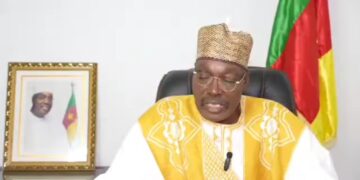![]()
For over 50 years, 75-year-old Oladimeji Lawal has pedaled through the bustling streets of Lagos Island, selling ice cream to generations of schoolchildren and residents. Without a pension or retirement benefits, his livelihood remains tied to the wheels of his aging bicycle.
Pa Lawal, as he is fondly called, has become a familiar figure in Lagos Island, where he has sold ice cream to parents and, years later, to their children.
“I have sold ice cream to two to three generations of customers. There are students whose parents bought from me when they were young, and now those same parents tell their children that I once carried them in my arms here in Lagos Island,” he proudly stated.
Born in Ibadan on July 22, 1950, Lawal attended St. Patrick’s School in Abebi but had to drop out after Form 6 to find work. His journey into the ice cream business began in 1968 when he was hired by a woman named Mrs. Babalola, who needed a cycle boy to sell ice cream.
“She tested me by giving me a bicycle to ride, and when I rode it perfectly, she gave me the job. I worked on commission,” he recalled.
An accident in Ibadan left him hospitalized for days, prompting customers who visited only during holidays to encourage him to move to Lagos, where business opportunities were better.
He arrived in Lagos in 1969 and was introduced to an ice cream supplier on Odunlami Street by a couple, Mama Yemisi and her husband, who stood as his guarantors.
“I spent five years there and later worked for another company supplying ice cream in Obalende until 1976,” he said.
According to him, the business was once lucrative, with earnings reaching one pound and ten shillings daily.
“When I moved to Lagos, there were many sales. I saw another job offer that was ready to pay well, but I turned it down. Meanwhile, I also had a plan to save up some money to get a car and go into the transport business, but I got so attached to the work that I never thought of leaving it,” he admitted.
As the years passed, the ice cream business changed. Profits dwindled, and the job became more strenuous. By 1986, he had begun losing interest in the work but stayed due to a lack of alternatives.
“I once thought of becoming an agent too, but the capital wasn’t commensurate with my earnings and savings,” he lamented.
In an attempt to secure his future, Lawal saved up to buy a half-plot of land in Maroko, intending to build a home and retire. However, his dreams were crushed in 1990 when the then-military administrator of Lagos State, Raji Rasaki, demolished the Maroko community.
“The land was my future, my retirement plan. I had already bought a tipper of gravel for N90. But the demolition took everything. Back then, people didn’t talk much about Certificates of Occupancy. I didn’t have one, so I lost everything,” he recounted.
With no property and no financial backup, Lawal had no choice but to continue working. “There was no way I could save up since then because of commitments to the family. I also tried to seek help, but people only promised without fulfilling their promises,” he said.
Despite selling ice cream to some prominent figures in Lagos, he never received any substantial support. “At one point, some of them, including Princess Oyekan and one Mama Jide, contributed money to buy me a new bicycle when my old one was falling apart,” he noted.
Efforts by sympathizers to get him some form of benefit from the company he worked for were futile. “I told them not to bother because nothing was likely to come out of it. I wasn’t employed directly by the company. The only benefit I get from them is the raincoat they give us during the rainy season, and that was last given to us about ten years ago,” he said.
At 75, Lawal still pedals through Lagos Island, though at a slower pace. “If I don’t ride my bicycle for a day, I feel weak. My body is already used to it,” he said.
He dreams of opening a small shop where he can store ice creams and soft drinks, reducing the strain of daily cycling. “That way, I won’t have to ride around so much. I could still move around for about two hours daily, taking products to schools, but not for long hours like before,” he added.
Despite the hardships, Lawal remains grateful. “I met my wife here and married her in 1985. She had children for me, but she passed away five years ago. I have another wife in Ibadan. My children are doing their best, but I refuse to be a burden. I tell them not to give me money that will affect their livelihood because they are also managing,” he said.
While he sees his peers enjoying retirement, he remains content with his modest life. “At least, I am not begging for alms, and for that, I give thanks to God. What I am always mindful of is having a good name, just like Julius Berger,” he stated.

























